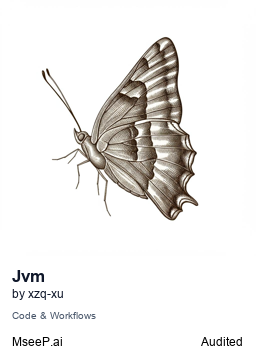About
A lightweight, zero‑dependency MCP server that uses JDK tools to monitor and diagnose Java applications locally or remotely via SSH. It provides AI agents with process listing, memory stats, stack traces, and advanced analysis such as method path tracing.
Capabilities

The JVM MCP Server is a lightweight, dependency‑free bridge that lets AI assistants query and diagnose Java applications using only the native tools bundled with the JDK. By exposing a standard MCP interface, it removes the need for heavyweight monitoring agents or external instrumentation libraries such as Arthas. Developers can therefore integrate JVM introspection directly into AI‑driven workflows—whether for live debugging, automated health checks, or continuous performance analysis—without modifying the target application or installing additional software.
At its core, the server offers a suite of monitoring primitives that mirror common JDK commands: for process enumeration, for memory snapshots, and for thread dumps. These primitives are wrapped as MCP tools (, , , etc.) that return structured JSON, making the data immediately consumable by an assistant. Advanced capabilities such as method‑call path analysis, class decompilation, and logger level management extend the basic tooling into richer diagnostics, enabling an AI to pinpoint performance bottlenecks or anomalous behavior with minimal human intervention.
Because the server relies solely on JDK utilities, it is highly portable across Linux, macOS, Windows, and any Java runtime that supports JDK 8 or newer. It can operate locally or over SSH, allowing remote monitoring of production JVMs without opening additional ports or deploying agents. This non‑intrusive design preserves the integrity of the target application and aligns with security best practices, as only standard JDK commands are executed.
Typical use cases include: (1) an AI assistant that automatically scans a fleet of microservices for memory leaks by polling data; (2) a chatbot that provides real‑time thread‑dump analysis during a support session; (3) continuous integration pipelines that trigger diagnostic tools when tests fail, feeding the results back into a knowledge base. In each scenario, the server’s lightweight footprint and zero‑dependency model make it easy to embed into existing infrastructure or cloud environments.
For developers familiar with MCP, the JVM MCP Server offers a clear advantage: it turns every Java process into a first‑class data source that can be queried, filtered, and visualized by an AI. By abstracting the complexity of JVM internals behind a simple protocol, it empowers assistants to perform deep diagnostics on demand, turning routine monitoring into intelligent, automated support.
Related Servers
MindsDB MCP Server
Unified AI-driven data query across all sources
Homebrew Legacy Server
Legacy Homebrew repository split into core formulae and package manager
Daytona
Secure, elastic sandbox infrastructure for AI code execution
SafeLine WAF Server
Secure your web apps with a self‑hosted reverse‑proxy firewall
mediar-ai/screenpipe
MCP Server: mediar-ai/screenpipe
Skyvern
MCP Server: Skyvern
Weekly Views
Server Health
Information
Explore More Servers
HLedger MCP Server
AI‑powered access to HLedger accounting data and reports
Hydrolix MCP Server
Secure, read‑only SQL access to Hydrolix via MCP
VulniCheck MCP Server
AI-Powered Security Scanning for Python Projects and GitHub Repos
Docker Hub MCP Server
LLM‑powered Docker image discovery and management
SearXNG MCP Server
Open-source web search via SearXNG API
Octagon Deep Research MCP
Unlimited AI-powered deep research for any MCP client